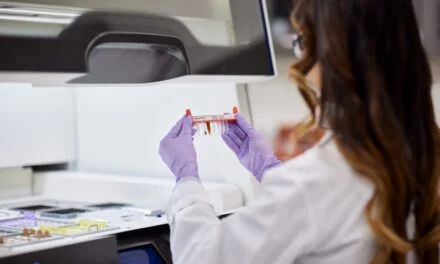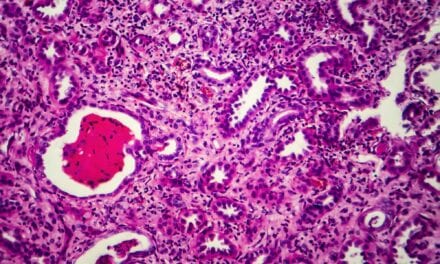Broad-based genetic testing gives clinicians better insights into chronic kidney disease, improving the odds of a good transplant outcome.
By Chris Wolski
Genetic testing has become a critical tool for diagnosing and treating numerous diseases and conditions. In a wide-ranging interview with CLP, Katya Brossart, MS, LCGC, a senior medical science liaison for Natera Organ Health, discusses the role genetic testing plays in kidney transplantation—specifically in identifying chronic kidney disease—how it aids in successful treatment and transplantation, and how the Natera test helps make testing more efficient. Brossart, a board-certified genetic counselor, also explains why genetic counseling is an important part of the testing process.
The following responses have been edited for length and clarity.
CLP: Genetic testing can reveal certain predispositions to chronic kidney disease in prospective kidney transplant patients. Why is it useful to know this?
Katya Brossart: Genetic testing to determine the cause of chronic kidney disease (CKD) at an early stage may enable treatment that can slow the progression of disease and provide information about prognosis—e.g., is the disease likely to progress to kidney failure and when?—but there are clear benefits for patients with late-stage disease as well.
Genetic testing of prospective kidney transplant recipients can help determine the likelihood of disease recurrence after transplant. Many genetic causes of kidney failure are less likely to recur, e.g., if the causative gene was expressed primarily in the kidney, which has now been replaced, which can be reassuring to patients and their families and help guide clinical management. Conversely, some rare genetic causes of kidney failure greatly increase the risk of loss of the transplanted kidney, which can often be avoided with timely diagnosis—by genetic testing—and treatment.
More than 600 genes are known to be associated with monogenic chronic kidney disease and kidney failure, and it’s usually very difficult to guess which gene or category of genetic condition is involved based on the patient’s clinical presentation.
This is even more of a challenge in patients with kidney failure, for whom the usual diagnostic tool of biopsy is often uninformative due to advanced disease.
CLP: The test Natera developed can screen for 385 genes—what advantage does this give clinicians at the diagnostic stage?
Brossart: As genetic testing for kidney disease becomes more common, there’s increasing recognition that a broad-panel NGS approach may be more efficient and cost-effective, which results in a higher diagnostic yield and requires less guesswork on the part of the clinician.
Interestingly, we’re finding that a small but significant number of patients tested with this broad panel have a dual genetic diagnosis, or a positive finding in more than one gene—often resulting in a complex clinical picture. This can have important implications for the patient, family, and healthcare team, and such findings are often missed by narrow panels.
CLP: Why is genetic testing important for making pre-transplant decisions?
Brossart: Identifying a genetic cause of the recipient’s disease is particularly important in living related donor situations. Kidney donation by a family member with the same, undiagnosed, genetic condition increases the risk of both the donor and the recipient needing a kidney transplant or dialysis in the future; of note, the risks of organ rejection and complications are considerably higher for patients who require a second kidney transplant.
Additionally, some of the more common genetic causes of kidney disease cannot be effectively ruled out based on imaging or other clinical testing, particularly in young adults.
Ultimately, appropriate donor selection guided by genetic testing improves outcomes for all and reduces the burden on the healthcare system.
CLP: How does the Natera test work?
Brossart: Developed for use in patients with both early- and late-stage disease, Natera’s Renasight is a broad next-generation sequencing (NGS) panel designed to identify germline genetic variants that cause or contribute to kidney disease. Administered either via blood draw or saliva swab, it analyzes 385 genes associated with 248 genetic conditions that cause chronic kidney disease, electrolyte disorders, and kidney stones in adults and children.
The test uses NGS-based clinical exome sequencing, which can detect a broad range of variants, including single nucleotide variants (SNVs), small insertions and deletions (indels), and large copy number variations (CNVs).
Renasight also employs independent or orthogonal methods of variant confirmation depending on the region and gene. For example, defects in the PKD1 gene are the primary driver of autosomal dominant polycystic kidney disease (ADPKD), which is the most common inherited cause of kidney disease. Historically, PKD1 testing has been pretty inaccurate, as it is complicated by “pseudogenes,” or regions that may look the same by NGS at first pass, but are not actually within the gene of interest. The Renasight test uses long-range PCR for PKD1 variant confirmation, greatly increasing the accuracy as compared to other tests that do not include this extra step.
CLP: How important is genetic counseling during this process?
Brossart: One of the things Natera provides, at no additional cost, is access to a team of board-certified genetic counselors (GCs) who have a great deal of expertise with the Renasight panel and monogenic kidney disease in general. These GCs are able to answer questions and provide guidance to physicians and patients about the implications of the results.
Genetic counselors can explain next steps/actionability of genetic testing results, as well as inform and counsel family members about their own risks related to their family member’s genetic testing result.
Nephrologists often have limited formal genetics training. There can be some nuance to genetic testing results and there are significant limitations to what is currently known—even among genetic experts—about the role that genetics plays in nephrology.
Genetic counselors can work hand-in-hand with transplant nephrologists to inform the interpretation and actionability of gene panel results, which can in turn influence treatment decisions and improve patient outcomes.
CLP: How does genetic testing affect labs’ effectiveness and efficiency?
Brossart: Because they test for a wide variety of genes associated with chronic kidney disease, broad panels such as Renasight ultimately provide more opportunities for an exact diagnosis and offer physicians the most complete prognostic information available, which can improve the clinical laboratory experience by saving time, staffing, resources, and money on repeat genetic tests.
Featured Image: Natera’s Renasight is a broad next-generation sequencing (NGS) panel designed to identify germline genetic variants that cause or contribute to kidney disease. Photo: Natera
Chris Wolski is chief editor of CLP.





